Refugees
Iraq’s displaced Kurds hope to return home after Turkey’s Kurdish militants declare a ceasefire
GUHARZE, Iraq (AP) — Iraqi Kurdish villagers, displaced by fighting between Turkish forces and Kurdish militants that has played out for years in northern Iraq, are finally allowing themselves to hope they will soon be able to go home.
Their hopes were raised after the Kurdistan Workers’ Party, or PKK, on Saturday declared a ceasefire in the 40-year insurgency against the Turkish government, answering a call to disarm from earlier in the week by the group’s leader, Abdullah Ocalan, imprisoned in Turkey since 1999.
The truce — if implemented — could not only be a turning point in neighboring Turkey but could also bring much needed stability to the volatile region spanning the border between the two countries.
In northern Iraq, Turkish forces have repeatedly launched blistering offensives over the past years, pummeling PKK fighters who have been hiding out in sanctuaries in Iraq’s northern semi-autonomous Kurdish region, and have set up bases in the area. Scores of villages have been completely emptied of their residents.
A home left decades ago
Adil Tahir Qadir fled his village of Barchi, on Mount Matin in 1988, when Iraqi dictator Saddam Hussein launched a brutal campaign against the area’s Kurdish population.
He now lives in a newly built village — also named Barchi, after the old one that was abandoned — about 2 kilometers (1.2 miles) away, south of the mountain.
He used to go back to the old village every now and then to farm his land. But that stopped in 2015 when Turkish forces moved in and set up camp there in the fight against PKK, hitting the group with wave after wave of airstrikes.
Iraqi Kurdish farmers and their lands became collateral damage. The Turkish airstrikes and ground incursions targeting PKK positions displaced thousands of Iraqi Kurdish civilians, cutting off many from their land.
“Because of Turkish bombing, all of our farmlands and trees were burned,” Qadir said.
If peace comes, he will go back right away, he says. “We wish it will work so we can return.”
Fighting emptied out villages in Iraq
In the border area of Amedi in Iraq’s Dohuk province — once a thriving agricultural community — around 200 villages had been emptied of their residents by the fighting, according to a 2020 study by the regional Iraqi Kurdish government.
Small havens remained safe, like the new Barchi, with only about 150 houses and where villagers rely on sesame, walnuts and rice farming. But as the fighting dragged on, the conflict grew ever closer.
“There are many Turkish bases around this area,” said Salih Shino, who was also displaced to the new Barchi from Mount Matin.
“The bombings start every afternoon and intensify through the night,” he said. ”The bombs fall very close … we can’t walk around at all.”
Airstrikes have hit Barchi’s water well and bombs have fallen near the village school, he said.
Najib Khalid Rashid, from the nearby village of Belava, says he also lives in fear. There are near-daily salvos of bombings, sometimes 40-50 times, that strike in surrounding areas.
“We can’t even take our sheep to graze or farm our lands in peace,” he said.
Ties to Kurdish brethren in Turkey
Iraqi Kurdish villagers avoid talking about their views on the Kurdish insurgency in Turkey and specifically the PKK, which has deep roots in the area. Turkey and its Western allies, including the United States, consider the PKK a terrorist organization.
Still, Rashid went so far as to call for all Kurdish factions to put aside their differences and come together in the peace process.
“If there’s no unity, we will not achieve any results,” he said.
Ahmad Saadullah, in the village of Guharze, recalled a time when the region was economically self-sufficient.
“We used to live off our farming, livestock, and agriculture,” he said. “Back in the 1970s, all the hills on this mountain were full of vines and fig farms. We grew wheat, sesame, and rice. We ate everything from our farms.”
Over the past years, cut off from their farmland, the locals have been dependent on government aid and “unstable, seasonal jobs,” he said. “Today, we live with warplanes, drones, and bombings.”
Farooq Safar, another Guharze resident, recalled a drone strike that hit in his back yard a few months ago.
“It was late afternoon, we were having dinner, and suddenly all our windows exploded,” he said. “The whole village shook. We were lucky to survive.”
Like others, Safar’s hopes are sprinkled with skepticism — ceasefire attempts have failed in the past, he says, remembering similar peace pushes in 1993 and 2015.
“We hope this time will be different,” he said.
Refugees
Turkish Cypriot group fears that local leader is Ankara’s man who wants to partition Cyprus
NICOSIA, Cyprus (AP) — The Turkish Cypriot leader in the breakaway north of the ethnically divided island of Cyprus is toeing Ankara’s line and doesn’t really speak for the local community there, an activist group said.
The accusations came after Sener Elcil of the newly formed Patriotic Turkish Cypriot Movement, a network of nongovernmental organizations and leftist parties, met with the island’s Greek Cypriot President Nikos Christodoulides.
Cyprus was divided when Turkey invaded the northern part of the island in 1974, following a failed, Athens junta-backed coup by supporters of union with Greece. Only Turkey recognizes a Turkish Cypriot declaration of independence and maintains more than 35,000 troops in the island’s northern third.
Although Cyprus joined the European Union in 2004, only the Greek Cypriot south, where the internationally recognized government is seated, enjoys full membership benefits.
Elcin’s movement says the island’s Turkish Cypriot leader Ersin Tatar follows Turkey’s directives for partitioning Cyprus into two states.
Turkish Cypriots urgently need an internationally negotiated deal to safeguard their distinct identity as inhabitants of the island because they’re being overwhelmed by a continuous population transfer from neighboring Turkey, he said.
“Tatar is representing Turkey also because he is behaving like a civil servant of Turkey,” Elcil said.
The meeting with Christodoulides came ahead of a United Nations-led meeting next week in Geneva bringing together the rival Cypriot leaders, the foreign ministers of Greece and Turkey, and Britain’s envoy for Europe to scope out chances of resuming formal peace talks.
U.N. Chief Antonio Guterres will host the two-day gathering, which starts Monday, in hopes of breathing new life in the Cyprus peace process that has been in hiatus for nearly eight years, after the last round of negotiations collapsed amid much acrimony.
No major breakthrough is expected in Geneva, but officials say they are looking for a “positive outcome” that would inject some momentum in the peace process.
Tatar has repeatedly said he would go to Geneva to rally for a two-state deal, claiming that the “old model” of resolving one of the world’s most intractable disputes — a federation made up of Greek and Turkish speaking zones — is no longer valid after decades of failure.
Greek Cypriots insist any deal that entrenches the island’s partition is a non-starter as it contravenes long-held U.N. resolutions endorsing a federation.
They also reject a Turkish and Turkish Cypriot demand for a permanent Turkish troop presence and military intervention rights under any accord, as well as a giving the minority Turkish Cypriots veto power over all federal-level government decisions.
Elcil colleague in the movement, Izzet Izcan, said the majority of Turkish Cypriots believe a federation is the “only solution” for Cyprus.
Tatar is up for reelection in the local vote in the northern part of Cyprus in October and Elcil said he is concerned it will be an easy win, with the influx of new residents of the north from Turkey — voters who will likely cast their ballots according to Ankara’s wishes.
Refugees
Turkish top officials make sudden trip to Damascus after Syria’s deal with Kurdish-led group
ISTANBUL (AP) — Turkey’s top diplomat, defense minister and intelligence chief paid a sudden visit to Damascus on Thursday, days after Syria’s interim government reached a deal to integrate a U.S backed Kurdish-led armed group into the country’s army.
The agreement to integrate the Syrian Democratic Forces, or SDF, into the Syrian government followed fierce clashes that erupted last week between government security forces and gunmen loyal to ousted leader Bashar Assad.
Monitoring groups said hundreds of civilians were killed in the violence in Syria’s coastal communities, primarily targeting members of the Alawite religious minority to which Assad belongs.
Ahmad al-Sharaa, Syria’s interim president and a former rebel, met with Hakan Fidan, Turkey’s foreign minister; Yasar Guler, defense minister, and Ibrahim Kalin, head of national intelligence. They were accompanied by Turkey’s ambassador to Syria, Burhan Koroglu.
According to local news agency DHA, an official from the Turkish Defense Ministry, speaking on the customary condition of anonymity, said earlier Thursday that Ankara intends to examine “how the agreement reached will be implemented and its reflections on the field.”
The official added that Turkey’s expectations on Syria have not changed.
“There is no change in our expectations for the termination of terrorist activities in Syria, the disarmament of terrorists and the expulsion of foreign terrorists from Syria,” the official said.
Turkey designates the SDF and its military arm, People’s Protection Units, as terrorist organizations because of their links to the banned Kurdistan Workers’ Party.
As the Turkish delegation was flying unannounced to Damascus, Turkey’s President Recep Tayyip Erdogan presented awards for “benevolence and kindness” to a former Syrian fighter pilot imprisoned for 43 years.
The ceremony, hosted by a foundation linked to Turkey’s religious authority, honored Ragheed al-Tatari. Erdogan praised al-Tatari for his perseverance and gave him an award for his “benevolence”.
Al-Tatari was imprisoned under the rule of Syrian presidents Hafez al-Assad and later Bashar al-Assad. He had been detained since 1981. There are conflicting accounts for his imprisonment including refusing to bomb the city of Hama and failing to report a pilot desertion attempt.
Over four decades, al-Tatari was moved among prisons notorious for housing political inmates, including Palmyra prison and Sednaya. His imprisonment, described by human rights groups as one of the longest in Syria for a political prisoner, ended in December when opposition forces freed him.
In a speech on stage, Erdogan lauded al-Tatari, calling him “the brave Syrian pilot who listened to his conscience.”
Refugees
Syria announces the end of a military operation against Assad-linked gunmen
DAMASCUS, Syria (AP) — Syria’s interim government signed a deal Monday with the Kurdish-led authority that controls the country’s northeast, including a ceasefire and the merging of the main U.S.-backed force there into the Syrian army.
The deal is a major breakthrough that would bring most of Syria under the control of the government, which is led by the Islamist group Hayat Tahrir al-Sham that led the ouster of President Bashar Assad in December.
The deal was signed by interim President Ahmad al-Sharaa and Mazloum Abdi, the commander of the U.S.-backed, Kurdish-led Syrian Democratic Forces.
The deal to be implemented by the end of the year would bring all border crossings with Iraq and Turkey, airports and oil fields in the northeast under the central government’s control. Prisons where about 9,000 suspected members of the Islamic State group are also expected to come under government control.
Syria’s Kurds will gain their “constitutional rights” including using and teaching their language, which were banned for decades under Assad. Hundreds of thousands of Kurds who were displaced during Syria’s nearly 14-year civil war will return to their homes.
The deal also says all Syrians will be part of the political process, no matter their religion or ethnicity.
Syria’s new rulers are struggling to exert their authority across the country and reach political settlements with other minority communities, notably the Druze in southern Syria.
Earlier Monday, Syria’s government announced the end of the military operation against insurgents loyal to Assad and his family in the worst fighting since the end of the civil war.
The Defense Ministry’s announcement came after a surprise attack by gunmen from the Alawite community on a police patrol near the port city of Latakia on Thursday spiraled into widespread clashes across Syria’s coastal region. The Assad family are Alawites.
“To the remaining remnants of the defeated regime and its fleeing officers, our message is clear and explicit,” said Defense Ministry spokesperson Col. Hassan Abdel-Ghani. “If you return, we will also return, and you will find before you men who do not know how to retreat and who will not have mercy on those whose hands are stained with the blood of the innocent.”
Abdel-Ghani said security forces will continue searching for sleeper cells and remnants of the insurgency of former government loyalists.
Though the government’s counter-offensive was able to largely contain the insurgency, footage surfaced of what appeared to be retaliatory attacks targeting the broader minority Alawite community, an offshoot of Shia Islam whose adherents live mainly in the western coastal region.
The Syrian Observatory for Human Rights, a Britain-based war monitor, said 1,130 people were killed in the clashes, including 830 civilians. The Associated Press could not independently verify these numbers.
Al-Sharaa said the retaliatory attacks against Alawite civilians and mistreatment of prisoners were isolated incidents, and vowed to crack down on the perpetrators as he formed a committee to investigate.
Still, the events alarmed Western governments, who have been urged to lift economic sanctions on Syria.
U.S. Secretary of State Marco Rubio in a statement Sunday urged Syrian authorities to “hold the perpetrators of these massacres” accountable. Rubio said the U.S. “stands with Syria’s religious and ethnic minorities, including its Christian, Druze, Alawite, and Kurdish communities.”
____
Mroue and Chehayeb reported from Beirut.
-
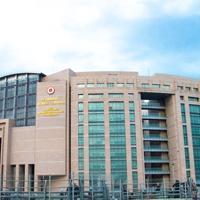
 Daily Agenda2 months ago
Daily Agenda2 months ago5 suspects nabbed for sharing information with Iranian intel
-
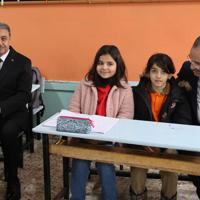
 Politics2 months ago
Politics2 months agoSoutheastern city enforces fines to tackle student absenteeism
-
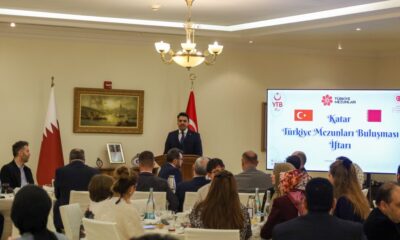
 Lifestyle2 months ago
Lifestyle2 months agoTürkiye’s Embassy in Doha hosts iftar for alumni to foster connections
-
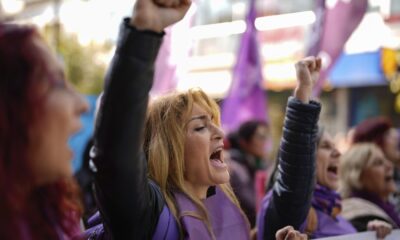
 Refugees2 months ago
Refugees2 months agoInternational Women’s Day: global protests demand equal rights
-

 Daily Agenda2 months ago
Daily Agenda2 months agoTrump hangi ülkelere yasak getirdi.
-
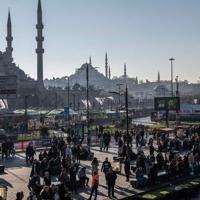
 Politics2 months ago
Politics2 months agoIstanbul ‘may break 110-year temperature record for March’
-

 Sports2 months ago
Sports2 months agoPaulista 19 maç sonra geri döndü, maç sonrası isyan etti
-

 Economy2 months ago
Economy2 months agoSweden to hold talks on countering soaring food costs

